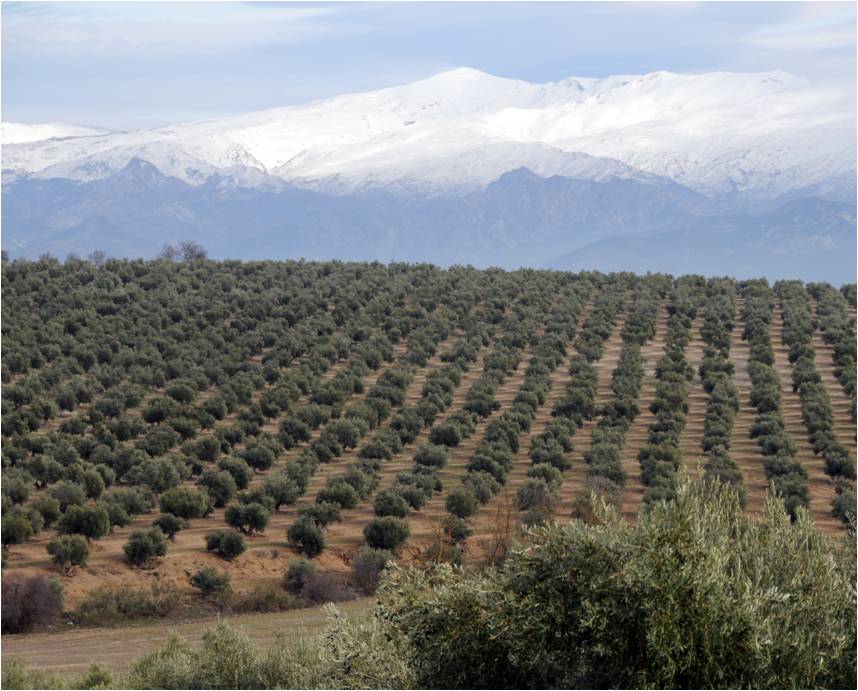Organised by:
- International Olive Council (IOC)
- Mediterranean Agronomic Institute of Zaragoza – International Centre for
Advanced Mediterranean Agronomic Studies (IAMZ-CIHEAM)
Background and objectives of the Seminar
Olive cultivation constitutes a key element of the Mediterranean agricultural sector. Olive tree is well adapted to the Mediterranean climate, characterised by low rainfall, high temperatures in summer and mild winters, and is capable of growing in poor soils. From the almost 3.3 million tonnes of olive oils estimated by IOC to be produced in the world in the 2011/2012 crop year, 97% comes from the Mediterranean region. For table olives, the other important olive product, 83% of the 2,6 million tones estimated to be produced in the 2011/2012 crop year comes from this same region.
Olive oil and table olive production has increased dramatically in the last decades, with more than doubled for olive oils and 2.7 times for table olives. This increase has been partly due to the establishment of intensive olive plantations using production systems very different from the traditional and incorporating techniques as irrigation, improved genetic material, pruning, planting distances, etc., which have allowed high yields and a large degree of mechanisation. Nevertheless, the important role played by traditional olive production systems in many harsh and less favoured Mediterranean areas should be not forgotten, as these systems are multifunctional and contribute to rural development, landscape conservation and preserve environment against erosion and desertification.
Consumption of olive products has followed similar patterns, the Mediterranean region being the most important consumer, although other big countries both external to the EU such as USA (with 275 thousand tonnes of olive oil and 240 thousand tonnes of table olives consumed in the 2011/12 crop year, almost all imported), Brazil, Australia and Canada and from the EU (especially Germany and United Kingdom) are becoming important consumers and importers. This continuous growing of markets is due to gastronomical qualities of olive products and to their condition of healthy food based on their nutritional and functional properties which have been well promoted as one of the best identified elements of the Mediterranean diet. Undoubtedly there has also been an important improvement in post-harvest and processing in order to respond to the demands of high quality standards required in these very developed markets.
With this background this Seminar will prospect the future of the olive sector in the Mediterranean and the world, trying to answer the following key questions: Are intensive production systems sustainable and will the future of olive development being based on them or should there still be an important role for traditional systems? Which are the key elements to be improved in processing technologies, especially in those countries that still have an important part of their production which cannot gain access to the markets demanding a high quality? In addition to the well known nutritional and functional properties of olive products, which are their prospects as raw material base for the nutraceutical industry? Which are the keys to open new markets and to increase the share in consolidated markets?
Organisation
The Seminar is organised by the Mediterranean Agronomic Institute of Zaragoza (IAMZ-CIHEAM) and the International Olive Council (IOC), two institutions that have recently reached their 50th anniversary serving the Mediterranean region and the olive sector. The Seminar will provide 2 days of forum for scientific and technical exchanges, distributed in three sessions, with key note presentations and case studies, and one round table, and a one-day trip in the third day.
Scientific Committee
- R. d'Andria, Italy R. Fernández Escobar, Spain M. Msallen, Tunisia
- A. Assabah, IOC D. Gabiña, IAMZ-CIHEAM M. Parras, Spain
- C. Bairrao, IOC A. López-Francos, IAMZ-CIHEAM L. Rallo, Spain
Organisation Committee
- I. Romagosa, IAMZ-CIHEAM D. Gabiña, IAMZ-CIHEAM A. López-Francos,
IAMZ-CIHEAM
- J.L. Barjol, IOC A. Assabah, IOC C. Bairrao, IOC









